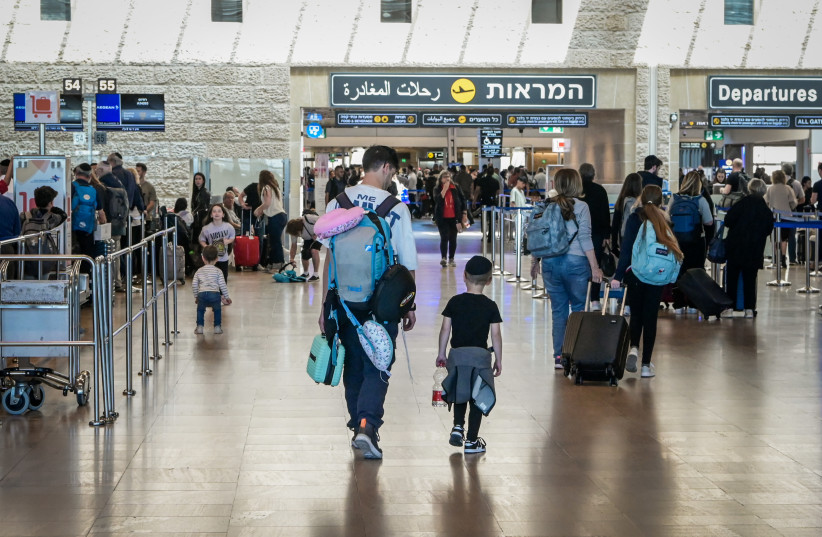There was a sci-fi movie I saw many years ago, the name of which I have long since forgotten since it was a decidedly average production.
The villain of the film controlled his victims by inserting into them a magnetic chip, while he used a super-powerful magnetic field to control their movements. Every time one of the characters tried to flee, the power of the magnet was ratcheted up and the poor victim was unable to escape its clutches.
This reminds me of Eretz Yisrael, our wonderful Land of Israel.
I am writing this 26,000 feet in the air on board a plane with my wife bound for Australia to visit our children and grandchildren, whom we haven’t seen for quite some time.
In usual circumstances, the pleasurable anticipation of hugging the kids and spending quality time with them would be all-consuming. Normally, we can’t wait to arrive, dole out the gifts, and catch up in person with all that is going on in their far-away lives.
But these are not usual circumstances and normality seems like a distant memory.
The desire to remain in Israel during the war
Even the thought of leaving during these incredibly difficult times, albeit only for two weeks, seems like treason.
How can we go on vacation while our brave boys and girls are fighting on four fronts (at least)?

On the train to the airport, we encountered several soldiers making their way back to base, and the power of the magnet was turned up further.
On the ramp down to the departure area at Ben-Gurion Airport, large photographs of the hostages are strategically placed one after the other, displaying a seemingly never-ending nightmare for the traveler to contemplate.
The morning news, containing the details of the loss of yet more heroes, weighed incredibly heavily on our shoulders.
The atmosphere in the airport itself was subdued and the usual bustle and noise were conspicuously absent.
The pull of the land, our unwavering desire and belief in our right to be in our ancient homeland, and the sadness of the loss of the youthful flowers of our people are almost too much to resist – and like the magnet in the lousy movie, it exerts an energy-sapping influence over its subjects.
So, here we are, fighting our emotions, feeling guilty for abandoning our Israeli family, our community, and the nation at war, and yet excited to reconnect with the Aussies.
It’s part of the wider question of how to behave in general in difficult times.
IN SOME ways, it is a generational thing.
The generation that escaped the European pogroms and Holocaust often inculcated into their children, the first to be born in the relative freedom of the USA, UK, or other safe havens, that it was “almost a sin to enjoy yourself.”
The baby boomers who came next (like me) enjoyed the fruits of our parents’ hard work and their begrudging themselves in order to provide better opportunities for us. As a consequence of this and the fact that, in the Diaspora, we didn’t experience war directly, this generation has become, almost inevitably, a bit spoiled, and consequently, less resilient in times of stress. Perhaps this is why we don’t quite know how to behave. Is it OK to go out to dinner? To make a birthday party? Or is it disrespectful to those fighting on our behalf?
Israel and Israelis are different.
They live their lives on the edge. Existential threats are a real issue. We know we will serve in the army, or our children and grandchildren will, with all the anxiety that this generates. We know we have to fight for every right, work harder than anyone else to survive in a hostile world and, God forbid, may have to make the ultimate sacrifice.
And yet, Israel and Israelis live life to the full. Every Simcha, every chag (festival), every birthday, every opportunity is celebrated with joy and energy.
When I first made aliyah, I found it so hard to understand the transition in an instant from the sadness of Remembrance Day, when we mourn with every fiber of our being the loss of each brave hero of Israel, to the wild partying and fireworks celebrations of Independence Day. It just didn’t seem right.
But over time, it has dawned on me that it is precisely because of the sacrifices made by others, whose belief in Am Yisrael Chai (Jewish peoplehood) was so strong that it drove them on to such heights of courage and bravery, that we must live life to the full and appreciate every joyful moment we are granted.
We are the people of hope. Our national anthem, “Hatikvah,” means “The Hope.” Our thrice daily prayers for thousands of years are full of hope. We only allow ourselves tiny moments of despair and despondency, like Remembrance Day, but then it’s back to the fullness and richness of life in Israel, where we, this privileged generation, are living the fulfillment of 2,000 years of hope.
So I tell myself and my wife to stop being miserable and enjoy the special time with our family, while at the same time feeling the pull of the most powerful magnet in the world.
The writer is a rabbi who lives in Ramat Poleg, Netanya, and is a co-founder of Techelet – Inspiring Judaism.
